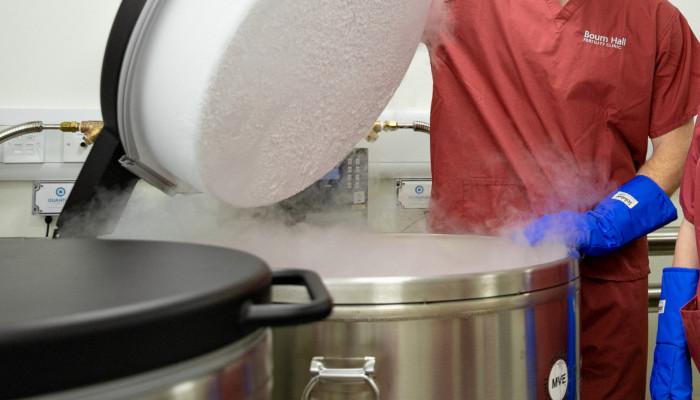Bourn Hall’s Medical Director Dr Thanos Papathanasiou says: “Currently the limit is 10 years, which creates an additional stress for couples and individuals, who may feel forced to make a decision before they are ready.
“Technology for freezing has improved and people are starting their families later. The reasons for freezing are diverse but may include not being ready or able to start a family, medical conditions, surgery or treatment that might lead to premature infertility, or undergoing gender re-assignment.”
Research from the Royal College of Obstetricians has suggested that with modern freezing technology eggs can be stored indefinitely without deterioration. Once thawed and used for IVF treatment the success rates are related to the age of the egg not the woman carrying the pregnancy.
The most common reason for egg freezing is to preserve fertility ahead of surgery or medical treatments that could compromise future fertility, for example surgical treatment for endometriosis or cancer therapies. It can also be used when there is a family history of premature menopause, and women that freeze their eggs for this reason may be in their twenties with a small window of opportunity to use their eggs. Egg freezing can also be an opportunity for women to keep their options open to have a baby in the future when the time is right for them.
Sperm freezing is an option that can also be used for fertility preservation ahead of surgery or treatment that could impair future fertility, such as chemotherapy.
Embryo freezing is used to store fertilised eggs during fertility treatment. It is recommended that one embryo is transferred for each treatment cycle, so additional embryos are frozen for further treatment if that cycle is unsuccessful, or for siblings at a later date.
Currently, when the ten years is up, prospective parents must decide whether to undergo fertility treatment, donate to research or to have the cells destroyed. Having to make this choice forces patients into a decision that they might not be ready to make.
Under the new system, they would be given the option to keep or dispose of the frozen cells or embryos at ten-year intervals, with a maximum of 55 years. The legislation will be introduced when parliamentary time allows.
Dr Papathanasiou says: “The proposed changes will provide greater choice over when to start a family and remove a time pressure on individuals and couples that for many is hugely stressful.”
Find out more about freezing eggs, sperm and embryos for fertility preservation at bournhall.co.uk.
---
Government statement from 6 September 2021: https://questions-statements.parliament.uk/written-statements/detail/2021-09-06/hlws252
